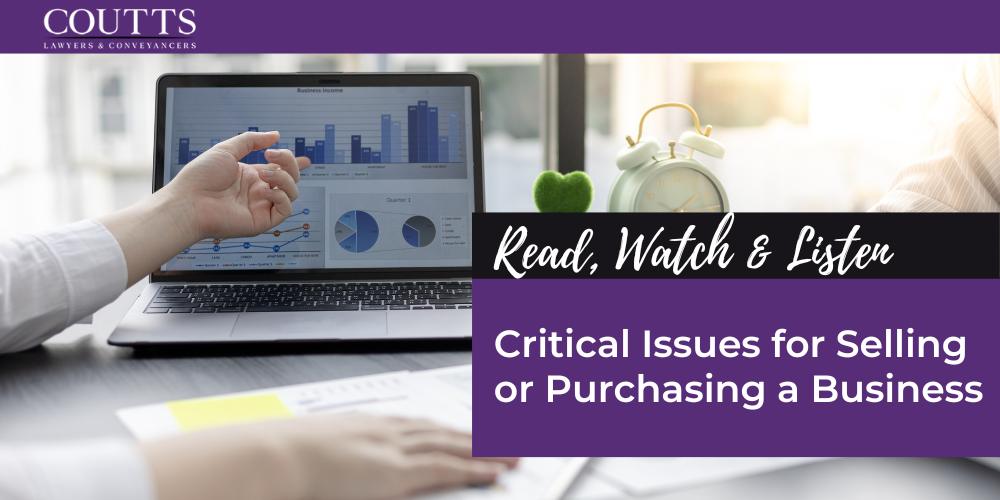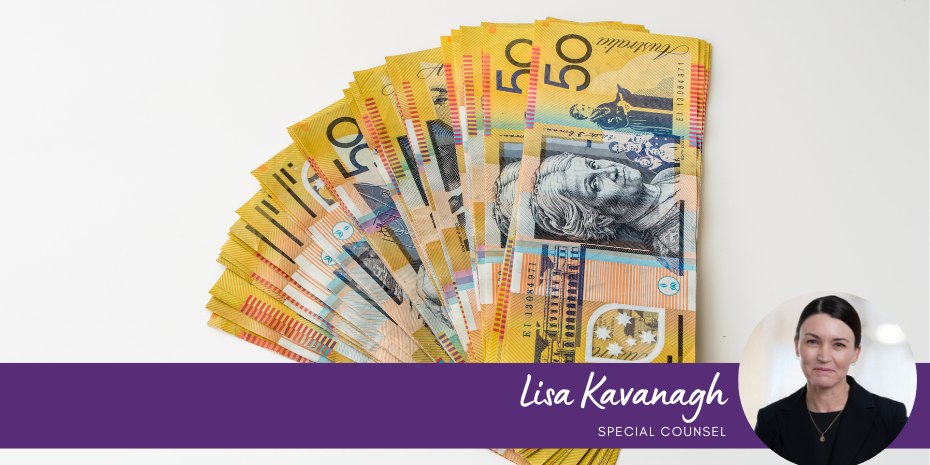Deciding to sell or purchase a business can be one of the biggest decisions you will face as a business owner. Even once you decide to sell or purchase a business there are several things that must be considered to try and ensure the sale runs as smoothly as possible. We have listed a sample of the critical issues that usually arise and considerations and risks for both vendors and purchasers.
-
Critical: Ensuring you use right structure to sell or purchase the business: asset sale or share sale
There are two common ways to buy or sell a business. It is important to make an informed decision as to the structure that is the most appropriate for you.
The first option is an asset sale. This is where the vendor (business seller) uses a Sale of Business Contract to sell the assets of the business to the purchaser. For example, the purchaser buys the business name, the equipment, the stock and the clients under that contract.
The second option is a share sale. This structure is typically used where the business is run by a company. Here, the vendor (business seller) is usually the director/shareholder of the company and will sell the business by selling their shares in the company through a Share Sale Agreement. This means that the purchaser will buy the shares in the company and become the director and shareholder in place of the vendor. By doing this the purchaser controls the company and as such controls the business and its assets and liabilities.
Coutts assists vendors and purchasers in identifying risks with each available structure and determining which structure is the most appropriate for the transaction.
-
Critical: Ensuring new business activities by the vendor are properly dealt with
If you are a vendor and you are thinking about opening a new business, you will need to consider whether you want to engage in certain activities which will compete with the business you are selling.
For example, you might be a real estate agent, and you might want to open another real estate agency in the future. Often a purchaser of a business will include a restraint period for a certain period of time and kilometres. So, you need to consider how this might affect or restrict you opening a new business.
On the other hand, if you are purchaser it is important to think about setting restraint periods and distances as you’d probably be unhappy if the vendor opened the exact same type of business down the road a few weeks after you bought, and business and customers started going there instead. That is, if the vendor became your direct competitor.
-
Critical: Ensuring confidentiality
Selling a business will often involve providing information that is confidential and private. Coutts can help you consider whether a confidentiality agreement is necessary for the parties as we understand the importance of ensuring the confidential details of a business remain confidential.
-
Critical: Understanding possible tax consequences
Once the purchase price is agreed on, both the vendor and purchaser need to think about how they are going to divide the purchase price between the good will and equipment of the business. This is known as apportionment of the purchase price and could have potential tax consequences.
Another factor to consider is whether the business will be sold on a walk in/walk out basis. For example, will the business continue to trade up until the settlement date? Will the vendor provide the purchaser with everything they need to continue to operate the business? This is known as the supply of a going concern and will affect whether GST is payable on the sale or not.
-
Critical: Ensuring the business premises are properly dealt with
If there is a lease over the property where the business trades, a vendor will need to get permission from the landlord to assign the lease to the purchaser or to permission from the landlord to grant a new lease to the purchaser. It is important for a vendor to arrange this otherwise after the sale of business, the vendor risks remaining committed under a lease for a business that it no longer owns.
For a purchaser, it is often crucial to obtain the consent of the vendor’s landlord because and obtain permission to use the premises when they become the business owner. That is, a purchaser can’t run the business at that location without the lease or other appropriate permissions.
Coutts regularly negotiate with landlords’ solicitors to arrange assigning or granting leases or any other necessary permissions to obtain or deal with the right to use the premises for the new purchaser or the removal of risk in premises for the vendor.
-
Critical: Ensuring employee entitlements are properly dealt with
If you’re a vendor and you have employees, you will need to think about their entitlements such as annual leave, sick leave and long service leave, and whether the employees are being transferred to the new purchaser. If the employees are transferred there is usually an adjustment for the purchaser to cover employee accrued entitlements.
If you’re a purchaser, you need to think about whether you will keep any of the current employees. You need to inform the vendor of your decision, so they can either give notice to employees to terminate their employment or make an adjustment in your favour for any entitlements owed to the employees that you are retaining.
-
Critical: Ensuring stock is properly dealt with
A vendor should consider whether they have stock that needs to be sold with the business. For example, if you own a hairdressing salon you might sell shampoos and hair straighteners from suppliers. If so, a vendor should consider whether the value of the stock is included in the purchase price or if the purchaser will be paying extra for the stock, together with how the stock is valued.
If the purchaser is paying extra for the stock, you should also consider how the stock will be valued. Perhaps the vendor and purchaser will complete a stock-take together, or a sum will be agreed, or maybe an independent valuer will be appointed to complete the stock-take.
For a purchaser, it is important to know whether the purchase price includes stock or if you need to pay extra for stock, so you can ensure that you have the funds available. If you are paying extra for the stock, you should consider negotiating a trading stock maximum with the vendor. This means you can set a maximum amount for stock, for example $20,000.00. Then, for example, if the stock is valued at more than $20,000.00 you can choose which stock to purchase up to that amount.
Recommendations
A properly prepared Sale of Business Contract is integral in addressing risks and issues, protecting your interests and ensuring that what can be a complicated process is as stress free as possible. Even if you and the purchaser have agreed on what seems like the major elements of a sale of business, such as the purchase price and the date for settlement, Coutts are here to assist in ensuring the smaller (but often equally as risky) details that are the foundation to a smooth sale of business are considered and dealt with and ensuring risks are addressed long term and properly.
If you are after the best advice on how to sell or purchase a business, call Coutts Lawyers & Conveyancers on 1300 268 887 and book an appointment
For further information please don’t hesitate to Contact Coutts today.
This blog is merely general and non specific information on the subject matter and is not and should not be considered or relied on as legal advice. Coutts is not responsible for any cost, expense, loss or liability whatsoever in relation to this blog, including all or any reliance on this blog or use or application of this blog by you.



